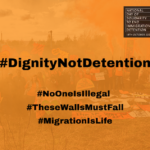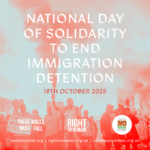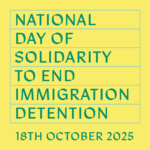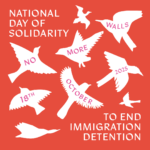
In just three years, the government has gone from actively recruiting migrant carers to slamming the door shut, not in one swift motion, but in a series of steps that have steadily chipped away at rights and opportunities.
If you’ve come to the UK as a care worker, to support older people or those living with different abilities, you already know the job is demanding. The hours are long, the pay often falls short of fairness and you are expected to hold together a crumbling social care system, with minimal support.
But for many migrant carers, the hardest part isn’t the work. It’s surviving an immigration system that keeps shifting the goalposts – and almost always in the same direction, with fewer rights, harsher rules and less stability.
The UK has an acute shortage of care workers. Yet there are thousands of migrant carers in the country who are not allowed to work because their immigration status has been tied up in bureaucracy, employer misconduct or deliberate policy change.
This is our second blog in a series we are writing about the significant changes to the Immigration Rules that were announced in July 2025. In this blog, we discuss carers.
The door opened in 2022 – and is further closing in 2025
In early 2022, as the care sector buckled under the weight of the pandemic and the loss of workers following Brexit, the government added ‘care worker’ roles to the list of jobs eligible for the Health and Care Worker Visa. It was billed as a solution to emergency staffing shortages.
The result was a rapid influx: nearly 60,000 overseas care workers arrived in the UK between 2022 and 2023, many from Nigeria, India, Ghana, Zimbabwe, the Philippines, and Bangladesh.
But behind the numbers was a exploitative story. Many carers paid thousands of pounds in illegal recruitment fees. Some had passports confiscated. Others were underpaid, housed in unsafe conditions, or forced into unpaid overtime. As overseas care workers increased so did incidents of abuse against these workers.
By 2023, the political climate shifted. Media headlines and government speeches began targeting what was incorrectly named as ‘too many migrants’, ‘low-skilled labour’ and ‘abuse of the system’.
Instead of addressing the negative stereotyping and the impact this has on the rise of racism, the Government reached for what we have often seen as the typical State response to negative migrant rhetoric: by restricting migration.
In March 2024, overseas carers were prevented from bringing in their dependants. The official reasoning was to ‘cut migration’ and ‘tackle visa abuse’ but the result was carers facing painful choices: separation from their partners and children, or leaving the UK altogether.
At the same time, only care providers registered with the Care Quality Commission (CQC) could sponsor overseas carers. While this aimed to crack down on rogue employers, it also squeezed out smaller agencies and left many carers stranded if their sponsor lost approval.
The Rematching Scheme: A Broken Promise
Between 2023–24, the Home Office revoked the sponsorship licences of 470 care agencies, leaving more than 39,000 migrant carers without legal permission to work.
In an attempt to To fix this, the government launched a ‘Displaced Worker Scheme’ with regional hubs funded to match carers with new employers. But the scheme has been a near-total failure. Out of 28,621 carers who applied, only 941 (3.4%) were successfully placed in new jobs. Many were left in limbo, unable to work, unable to pay rent and at risk of removal.
2025: The Latest Clampdown
From 22 July 2025, employers have no longer been able to sponsor new overseas care workers under the Skilled Worker route. This means:
- No new Certificates of Sponsorship have been issued since this date.
- Care roles like home carers or care assistants will no longer meet the government’s ‘skilled job’ criteria.
- Overseas recruitment for care workers and home carers will end.
For those already here:
- Health and Care Worker visas can still be renewed or switched to another sponsoring employer, but only until 22 July 2028.
- Workers must remain in care roles if they want to keep their visa; you can’t switch from another health role into care.
- After 2028, even existing carers may lose the right to extend their visa. We are yet to see how this will develop.
A clock has been set. The UK built much of its care workforce with overseas labour – and now it has given notice that the labour will no longer be welcome.
A Gradual Erosion of Rights
This is not an isolated event. It follows a familiar cycle:
- Recruit when desperate — open routes, lower entry barriers.
- Restrict when politically convenient — rebrand jobs as ‘low-skilled’ and cut off access.
- Ignore the fallout -leave workers trapped, undocumented, or forced out.
we saw this with:
- The Windrush generation, invited to staff the NHS and public transport, then later targeted by hostile environment policies.
- EU workers, whose rights were curtailed after Brexit.
It is a country that welcomed carers when desperate, but discarded them once political winds shifted.
A country that calls life-saving work ‘low-skilled’ to justify exclusion. A country that relies on migrant labour to hold up a collapsing care system, while refusing to grant those workers stability, dignity, or the chance to build a life.
And it is carers, often women, often from the Global South, who are paying the price.
Living with Insecurity
For migrant carers already in the UK, the risks are multiplying:
- Being underpaid or forced into unpaid overtime.
- Illegal recruitment fees.
- Unsafe or overcrowded housing.
- Passports confiscated by employers.
- Threats of visa cancellation if they complain.
Some have been left undocumented after their sponsor lost a licence. Others face impossible choices: stay in abusive work to keep a visa, or leave and lose legal status
Narrowing Pathways, Closing Windows
For now, some options remain:
- Extend your visa with a registered sponsor.
- Bring dependants if you arrived before the 2024 rule change.
- Apply for settlement if you’ve nearly completed five years’ lawful stay.
But these opportunities are vanishing. After 2028, even renewals will end and without reform, many carers could be pushed into undocumented status.
This Is About More Than Visas
This moment is not only about care workers, it’s about the kind of country the UK is becoming.
A country that leans on migrant labour to keep its care system standing, then cuts workers loose when they no longer fit the political narrative.
A country that calls life-saving work ‘low-skilled’ to justify exclusion.
A country that quietly erodes rights, one policy change at a time, until the safety net disappears.
For migrant carers, this is a painful moment. But it is also a moment to speak out, to organise, and to demand policies that value people over politics. It is a moment for us all to stand alongside in support.
We are grateful to Cecelia Castelli for the image used in this update.
















Discussion: